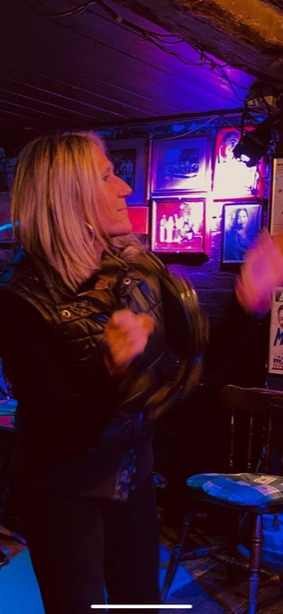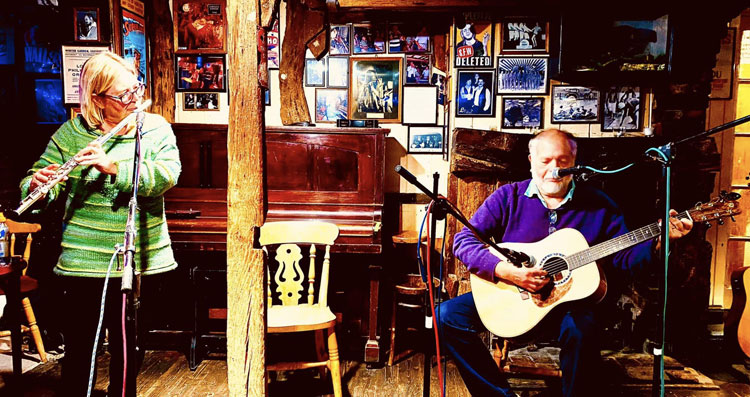 18th October 2022 And so the ladies have their turn Their notes they wrap themselves around And so the tambourine it gets caressed Those belles within the ‘Bells they do sound And so the white boys sing the blues For it is there for us all to share And so the black guitar it sings again “Good Morning” I bid you if you dare And so brothers from across the world They come together for just one night And so their rock n roll dreams live on Their album bearing T-shirts oh so tight And so we welcome more new friends Into our midst they do wander And so the old guitars they keep making Music that’s not to be cast asunder And so the glamorous sister she does dance Accompanying all with her fullsome rhythm And so all are welcome to join in this fun We must accept one another, that is a given And so we move on along life’s single road Please let us put this conflict away And so the music it should only unite us Let’s try and make the most of every remaining day . . .
0 Comments
 27th September 2022 .There was a certain ambiguity about how I’d specified the evening as Vintage/Goodtime. However, I thought I knew what I meant, and everyone else thought they did, so we were all on message in some way. Having been in London all day, I just managed to arrive for the 1945 start and many thanks to the kind soul(s) who started to write the playlist before I got there. Also of course thanks to the merry humpers Simon et al who set up and dismantle the kit, and Jason on sound with Lance’s help. I quickly tuned my guitar (more of this later) and launched into Diamond Ring Blues, a jug-band song of the 1920s or 1930s which is one big long enormous double entendre. Simon Watt started with Love is the Sweetest Thing, from 1932, written by Ray Noble and recorded by Al Bowly. It seems that a lot of these vintage bittersweet songs chug along nicely on a cycle of four chords with interest provided by which chords they are. However, Laura got up and raised considerably more interest than the harmonic analysis with her tambourine-slapping dance, which has become a featured part of Simon’s act. Laura, in case you missed it, is Lisa’s twin sister, not so long ago returned from distant Italy. Simon followed with Try a Little Tenderness, another Ray Noble recording of the same year, which emerged in The Commitments film of 1991after Otis Reading had made a soul hit version in the 60s. Brenda has become a regular over the past months, both here and at the White Horse Folk Club – which is to move to the Bells on alternate Mondays starting on 3rd October. She read, as a poem, the lyrics of an Alan Jackson song The Older I Get which produced looks of recognition on several faces and then did a short poem of her own. Brenda is also one to get up and dance, and did not disappoint later on. David and Pam arrived on stage next. Last time Pam danced while playing the accordion (is there no end to this dancing madness?) but this week was relatively static. They performed a 50-year-old Dick Powell song Water Bound followed by two segued instrumentals Staten Island and Shenandoah Fore, all with great, good-natured, competence. Lisa and Jason dipped into the Great American Song Book with Hoagy Carmichael’s Georgia On My Mind, and then surprised us all with a folky version of the King’s (Elvis that is, not Charles) Don’t Be Cruel. They have become very good at re-interpreting the genre of famous songs – I remember their sweet harmonies on Leadbelly’s Old Cotton Fields Back Home a few months back. Jane Ingles very rarely misses either the Bells or the White Horse. The Great Divide is part of her standard repertoire and fitted well tonight. In the true spirit of the vintage vibe, she came up with Dream a Little Dream of Me all the way from 1931. It was recorded by Wayne King and his orchestra in more innocent times and has been recorded by The Beautiful South and Mama Cass among many others. Jason returned for his spot and came up with some genuine goodtime smut with Diddy Wah Diddy, which he reckoned would have earned him a clip round the ear from his dad, Gerry, not for the lyrics but for his extended ragtime guitar solo, which sounded great to me. Diddy Wah Diddy was recorded by Blind Blake, among many others. The last time I heard it was a heavy electric version by The Blues Band at the Rye Festival a few years back. In the 1980s I played stand-up bass in The Brockley Brothers and we performed it every week during our residency at Bunjies. For his second song Jason called up Lisa and Helga on vocals and flute respectively for a cool enchanting version of Summertime. Clive hit another four-chord cycle in Blue Moon a real classic by Rodgers and Hart from 1934. He followed with Try to Remember (the kind of September….). I was surprised to find it was a musical song from the 1960s. Perhaps I’m conflating it with all those other earlier September songs – September in the Rain, September Song etc. Any way the songs were certainly in the spirit intended. Steph applied her mellifluous voice, and her sure knowledge of which chords lead to what, to the 1973 hit by Tony Orlando: Tie a Yellow Ribbon Round the Old Oak Tree and the 1939 song by Sheldon Harlech and Eric Ashworthy A Nightingale Sang in Berkely Square. ‘A bit of romance before the lights went out’ she told us. I suspect there was even more afterwards. Terry Lees arrived with some more Blind Blake – Blind Blake’s Rag – which he remembered Jason’s Dad Gerry playing when they did a gig together back in the day. He then came up with an excellent version of Dire Straits Juliet. Chris Martin did two of his original songs from 1989: Get Yourself a Good Time and Guardian Angel. You can’t argue that there’s not an implication of feelgood in those titles. One of the good things about the evening was frustration of expectations about how old, or young, the well-known songs were, where they came from and who wrote them. Heather performed Shine on Harvest Moon, which dated all the way back to the Ziegfeld Follies of the early 1900s and The Autumn Leaves or Les Feuilles Mort as the original Jaques Prevert version was known. Lance’s idiosyncratic songs are often about specific local characters (including quadrupeds) and local events. His first song Man’s Best Friend dated back a couple of years to neo-covid times when local Jack Russell Monsieur Hulot howled all through one of Helga’s songs. I was so lost in reminiscences of that wonderful era that I forgot to write down what his second song was. Sorry lance. Last in the cycle was John Stephens who went back to the 1960s to perform Paul Simon’s April, Come She Will and Leonard Cohen’s So Long Marianne. Thake you back to the times of huddling heartbroken and profound over Dansette record players in bedsits, little knowing the joys of the emerging Blue Nun era. I started round two with When Did You Leave Heaven, learnt from a Big Bill Broonzy EP in 1960-whatever. I asked Helga to join me in that easy jamming key but it turned out that my guitar tuner was actually a semitone flat, which meant that Helga had five sharps digging into her fingers. Sorry Helga. I tuned and we did it again. Much better all round. The 1960s and 1950s were well represented in the last round. Lisa and Jason: Wonderful World; Jayne Ingles: Big Yellow Taxi; Terry Lees: California Dreaming; and the anthropomorphic love song from Flanders and Swann: Mud, Glorious Mud. Does anyone know the difference between anthropomorphism and personification? It’s probably important. Chris Martin’s song from the late 80’s Life Ain’t Been Easy was intended for female singers with big voices but sounded good from him. Heather did Nobody Knows You When You’re Down and Out and I finished with a sing-song on Irene Goodnight. Which it was. Keith Willson |
AuthorThe person that runs the evening writes the blog Archives
February 2024
Note - You can leave a comment - by click ing on the blue "comments" link at the top and bottom of the blog. |